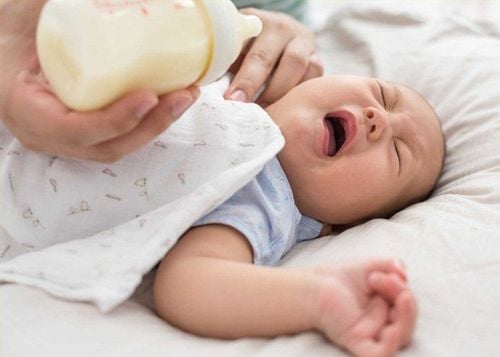This is an automatically translated article.
Babies who are intolerant to lactose in breast milk will often have diarrhea. Although this condition is not too dangerous, if left for a long time, it will affect the absorption of nutrients or cause chronic diarrhea in children. Therefore, parents should better understand the problem of lactose intolerance in infants, thereby providing timely intervention solutions.
1. What does infant lactose intolerance mean?
Lactose is a common sugar found mainly in breast milk, cow's milk, ..and dairy products. Lactose provides sugar and converts it into energy for brain and body activities. It can soften stools, help beneficial intestinal bacteria such as Bifidus and Lactobacillus, and at the same time strengthen the immune system and digestion in children. When lactose enters the intestine, it will be broken down into two sugars, glucose and galactose, thanks to an enzyme called lactase. This enzyme is produced by the intestinal microvilli. Without or deficient in this enzyme, the child's body will not tolerate lactose or called lactose intolerance. To put it simply, lactose intolerance is the inability of a child to digest and absorb lactose. As a result, the excess lactose that is not absorbed will enter the large intestine and be affected by bacteria that ferment it to form lactic acid, causing symptoms such as: Children have bloating, diarrhea, and sour stools. Due to the presence of lactic acid, there is a lot of foam in the stool, and even red skin around the anus may appear... The degree of symptoms depends on the amount of lactose absorbed more or less.
Types of infant lactose intolerance include:
Primary lactose intolerance: The most common and most common of all infant lactose intolerance cases. This case of lactose intolerance occurs as a result of relative lactase deficiency, which is common in older children and nutrition is substituted. When children replace milk with other foods or use less dairy products, the lactase enzyme will decrease. When using again, the child is lactose intolerant because at this time the body has a relative deficiency of lactase enzyme. Secondary lactose intolerance: Is caused by damage to the small intestine caused by bacteria and viruses. Children with transient lactose intolerance are reversible if the gastroenteritis is resolved. However, if children have diarrhea for a long time, it can lead to damage to the intestinal lining, making lactase enzyme not produced enough, leading to the body not able to absorb lactose and causing lactose intolerance in children. . Congenital lactose intolerance: In this case, the incidence of children is much lower than in the two cases above. It usually manifests itself soon after birth and is caused by a chromosomal disorder that prevents the production of the enzyme lactase. Children with lactose intolerance will have prolonged diarrhea, leading to severe malnutrition, poor appetite and growth retardation. Therefore, it is necessary to monitor children to detect timely manifestations and have appropriate treatment and care.

Trẻ không dung nạp lactose thường sẽ bị tiêu chảy
2. What to do when the baby is lactose intolerant in breast milk?
For children who are still breastfeeding, if they have lactose intolerance and have diarrhea, mothers should continue to breastfeed, absolutely do not give the baby a diet. Because if children diet or reduce eating will increase the risk of prolonged diarrhea and malnutrition in children.
In fact, breast milk is still the most suitable source of nutrition for babies after treatment with oresol solution. Breast milk has also been shown to be full of essential nutrients, helping babies recover from diarrhea faster. In particular, the rich immune factors in breast milk can also help strengthen the child's resistance and immunity, and regenerate the intestinal mucosa damaged by infection.
Almost when the baby has diarrhea, parents will often give antibiotics and limit nutrient-rich foods, do not give milk. But this is a very wrong concept because when doing so, children will quickly become deficient in nutrients and the disease will become more and more serious. For cases of diarrhea caused by lactose intolerance, mothers need to immediately eliminate foods containing lactose, can use lactose-free milk (also known as lactofree) until the child stops complete diarrhea. After about 1 to 2 weeks, when the baby's digestive system has completely recovered, the lactase enzyme will be fully produced again, and the mother can give the child the same diet as before.
Even in the case of children with diarrhea due to other causes, the use of lactofree milk in combination with other foods according to age is still considered an effective measure to help diarrhea disappear.
In addition, parents also need to pay attention to adding calcium to the child's diet during this period, because a lactose-free diet will reduce calcium absorption and affect the child's bone development. Add yogurt to help your intestines produce more beneficial lactase. If children have problems with foods made from milk, then mothers should increase foods rich in calcium and not derived from milk such as: Green vegetables, shrimp, snails ... for baby to develop bones, strong teeth.
In short, when babies are lactose intolerant in breast milk, they need to see a doctor for timely diagnosis and treatment advice. Late admission to the hospital increases the risk of secondary lactose intolerance in children. Prevention is very important in any case.

Trẻ không dung nạp lactose sẽ bị tiêu chảy kéo dài, dẫn tới suy dinh dưỡng nặng
Currently, the Pediatrics Department at Vinmec International General Hospital is trusted by many parents to examine the diseases that infants and young children are susceptible to. Vinmec brings satisfaction to customers and is highly appreciated by industry experts by:
Gathering a team of leading pediatricians: including leading experts with high professional qualifications ( professor, associate professor, doctorate, master), experienced, worked at major hospitals such as Bach Mai, 108.. The doctors are well-trained, professional, have a heart - a vision. Understanding young psychology. Besides domestic pediatricians, the Department of Pediatrics also has the participation of foreign experts (Japan, Singapore, Australia, USA) who are always pioneers in applying the latest and most effective treatment regimens. . Comprehensive services: In the field of Pediatrics, Vinmec provides a series of continuous medical examination and treatment services from Newborn to Pediatric and Vaccine,... according to international standards to help parents take care of their baby's health from birth to childhood. Advanced techniques: Vinmec has successfully deployed many specialized techniques to make the treatment of difficult diseases in Pediatrics more effective: neurosurgery - skull surgery, stem cell transplantation blood in cancer treatment. Professional care: In addition to understanding children's psychology, Vinmec also pays special attention to the children's play space, helping them to play comfortably and get used to the hospital's environment, cooperate in treatment, improve the efficiency of medical treatment.
Please dial HOTLINE for more information or register for an appointment HERE. Download MyVinmec app to make appointments faster and to manage your bookings easily.













